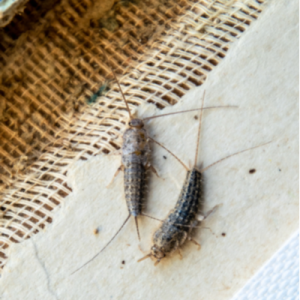Now that the warmer temperatures are consistently here in Northern South Carolina and the Charlotte area, you have probably already begun to see bugs show up in corners, along windowsills, and around screens quite frequently. Our warmer, humid climate attracts a multitude of insects and other pests, and for home and business owners, something we are constantly fighting a battle against. Some of these pests are just a complete pain in the butt. In this article, we talk about one, in particular, that is not only hard to detect but because their flat bodies can easily slip through cracks and crevices, is hard to eliminate. We are talking about strange, alien-looking silverfish.
Identity and Behavior of Silverfish
Silverfish are small, wingless insects that kind of look like centipedes. Their bodies are flat, and they are usually covered with scales. They have two long antennae attached to their head and three long bristles on their rear. They are approximately 1/2 to 3/4 inches in length and are white to brown-grey or bluish-silver in color. Their flattened bodies allow them to hide in very small cracks and crevices.
Adult silverfish may live two to eight years. In a lifetime, silverfish females lay about 100 eggs. They lay them singly or in small groups, hatching in three to six weeks. Young silverfish resemble adults, except they are smaller and more white. It only takes about four to six weeks to turn darker and grow to their full size.
Are Silverfish Dangerous?
While they can give you the heebie-jeebies, silverfish are not dangerous pests. They do not bite, sting, or transmit diseases to humans. They just creep us out when we are about to get a shower, and one is hanging out in our bathtub, or you open your kitchen cupboard, and antennas are staring back at you.
Why Are Silverfish Such a Problem?
Damage to Personal Items
While they are not dangerous to people, they can ruin your property and contaminate food sources. They are known for their destructive feeding habits. Silverfish feed on many different types of paper and fabric. They are attracted to various materials, including glue, wallpaper paste, book bindings, linen, rayon, and paper, often ruining books and clothing. Because they are nocturnal, they hide during the day and mostly come out at night. For this reason, they are usually discovered after the damage is done and you find out your favorite book is ruined or your paper files have holes. They also feed on carbohydrates and foods high in protein and will think nothing of making a snack out of your flour, pasta, oats, and cereals.
May Cause Allergies
While they do not transmit disease, they can cause some people to produce allergy-like symptoms.
May Be a Sign of Bigger Issues
Silverfish are moisture-seeking pests that need moisture and high levels of humidity to survive. In the summer months in Northern South Carolina and the Charlotte area, most of us have our air conditioning units on both at home and in the office. While they can be brought into your property in several ways (see below), it could also mean you have a water problem you are unaware of. It’s probably a good idea to check for leaky pipes, clogged gutters, or damage around the foundation of your property.
Other than Spotting a Silverfish, What Are Signs I Have a Problem?
Other than seeing them peer out at you from unsealed dried food packets or food containers, other signs that you have a silverfish problem include small holes and droppings left on old paper, books, and wallpaper. You may also find feces or yellow stains on clothing made from synthetic fabrics.
How Did They Get Inside My House?
Outside, silverfish tend to live in damp, dark areas like underneath fallen trees, leaves, debris, and mulch. When it becomes too hot during our South Carolina summers, they like to make their way inside our homes through cracks in the basement and exterior walls. Once inside, they prefer to dwell in dark, damp areas such as basements, attics, kitchens, and bathrooms. Homeowners often unknowingly bring silverfish inside when boxes and packages that contain hiding silverfish are brought indoors.
How Do I Get Rid Of Them?
First, start with the following to help with prevention once they are gone:
- Reduce excess humidity and dry out rooms or other areas using a fan or dehumidifier. Make sure ventilation in bathrooms is working properly.
- Seal up cracks and crevices that may be providing an entryway into the home
- Eliminate access to food sources, including store books, papers, fabrics, and stored food products. Items you want to keep for a long time should be stored in air-tight plastic bags or sealable containers. Mothballs may help.
Natural Ways to Eliminate Silverfish:
Silverfish are repelled by a few scents that humans enjoy. Use one of the following in your kitchen, bathroom, and storage areas:
- Cedar shavings
- Cinnamon
- Citrus fruit peels

- Cucumber peels
- Whole cloves
Use of Chemicals
Boric acid is used in museums and preservation facilities to keep silverfish out. There are baits that contain boric acid or you can mix it with water to make a diluted solution and spay infected areas. It is poisonous and can be harmful to children, pets, and adult lungs if inhaled, so be sure to use it properly or just call in the professionals who are trained and knowledgeable.
There are several insecticides on the market, including liquids and dust formulas. Many require small halls to be drilled in the walls to treat large populations, and control may take ten to 14 days. Always be sure to read the labels carefully as these products can be harmful to kids and pets.
Eliminate Silverfish and Other Pests With Indoor Pest Control Through the Experts at Cramer Pest
If your Northern South Carolina or Charlotte area home or business faces a silverfish problem, it’s best to call in the professionals. The experts at Cramer Pest Control have the experience and training in indoor pest control and can take the stress and worry out of your hands. Why risk getting anyone in your family getting sick from unfamiliar insecticides? We are trained professionals who do this for a living
Through our professional methods, we can determine where the silverfish live in your structure and eradicate them. Through our analysis, we will also prevent future infestations. Give us a call or contact us here to learn more. In South Carolina, you can reach us at 1-803-802-7540. For those homeowners and businesses in North Carolina, call 1-704-763-0204.
For other tips and ideas on pests and how to prevent them, check out our other blog articles.
Why Is the Silverfish Such a Problem for Carolina Homes in North Carolina and South Carolina
Protecting North Carolina and South Carolina
